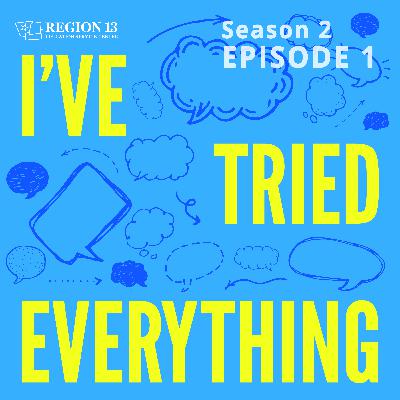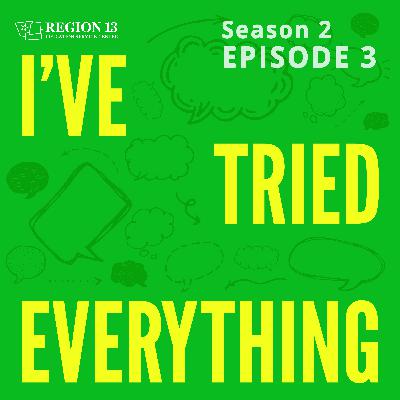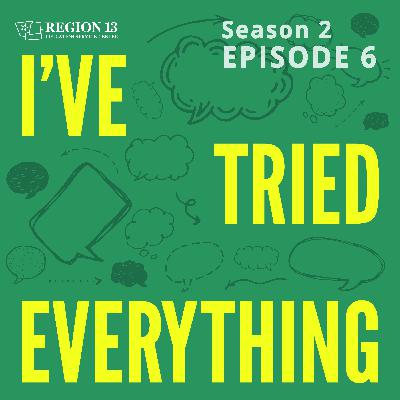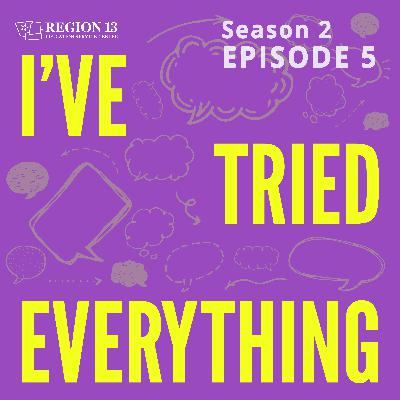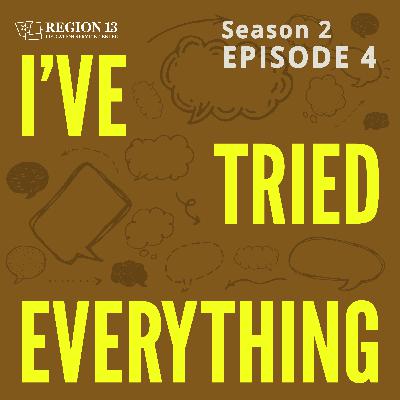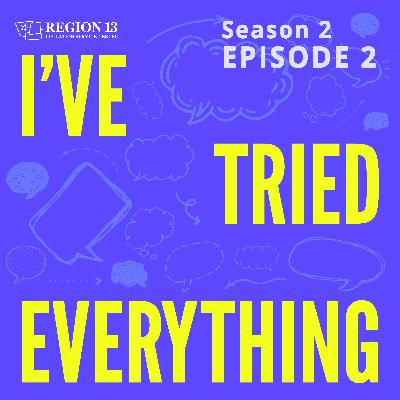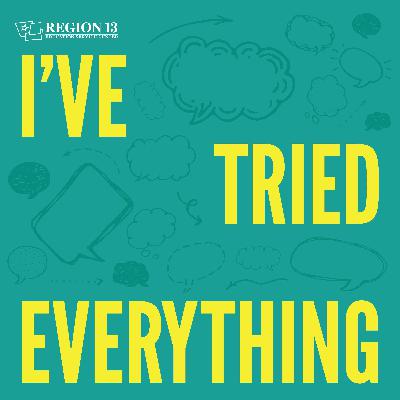S2-Ep1 - Tips And Take-aways For Being Trauma Informed
Description
Angela Eisenberg:
Hello, welcome back to I've Tried Everything, a podcast focusing on behavior supports in schools. I'm your host, Angela Eisenberg, project coordinator at Region 13. Every week I talk with educators just like you. We cover some tough topics, share stories, and explore what works and what doesn't. Let's go.
I am very excited to be joined by my colleague, Monica Kurtz. Monica, you have a wealth of knowledge around behavior and your experiences, either in the classroom, behavior classrooms, or supporting campuses, districts in the world of behavior.
What is your underlying passion for behavior support?
Monica Kurtz:
I really, really love thinking about behavior. I think about my own behavior. I think about your behavior. I think about everyone's behavior. And I like studying it. I like to understand why people act the way that they do.
And so I feel like, when I can help a student or I can help a teacher help a student get ahold of their behavior, create more positive behavior habits in their lives, I feel like I'm contributing to their lifelong success. Which is awesome. It's really, really, really, really awesome.
Other academic content areas are also important, Sure. Math, everybody needs math. But if you don't have the skills to be able to be productive in a classroom, then you're not getting the math. You're not getting the ELA or whatever it is until you can manage yourself in that environment.
But the other thing that behavior does is allow us to be full participants in relationships with the people in our world, and not just a relationship with your significant other. We have relationships with everyone that we come in contact with, even if only lasts five minutes in the HEB line. I still have a relationship with this person.
So the more that I understand my behavior, the more self-aware I am about how I'm doing during the day, the things that are impacting me on this day versus the day before or the day after, the more productive and healthy and beneficial the relationships that I engage in can be.
Angela Eisenberg:
I know one of your areas of interest with behavior is trauma. So talk to me about how your learning and excitement began with how trauma has affected behavior.
Monica Kurtz:
I came from a strong program. I spent 15 years at this school for the deaf, supporting students who had an auditory impairment, but also additional issues going on around being, ID or any myriad of things. And we had a really successful behavior program going. We had a lot of admin support teachers, paras, super well trained. We had a very, very strong program.
And there came a day when we got a student from another country, like an orphanage or something, whose behavior was so different. It was so different, and it was so challenging for us. The things that we had used with other students for so long had no impact on this child. And that really was one of the first things that got me interested in how our background impacts how we behave.
And then, almost at the same time, I came here to the service center. I was part of the behavior support staff network that Albert Phelps ran at the time. And in that same time period he talked about ACEs, adverse childhood experiences. And we watched the movie Paper Tigers. And I can remember body memory when he brought up the slide of Adverse Childhood Experiences. There are 10 things on that list, and I could identify with eight of them.
Angela Eisenberg:
Oh, wow.
Monica Kurtz:
And I thought, oh my God, this is me. This is me on a piece of paper. This is me. And, wow. And so then I started reading and doing research on early childhood trauma specifically. And so it was both personal and professional simultaneously. The more I understand early childhood trauma, the more I understand myself. And the more I understand early childhood trauma, the greater my empathy for other people who are also struggling.
And we know from research that early childhood trauma is so prevalent, right? 67 to 70% of people that you interact with have had some kind of thing that they're dealing with from their childhood, or they are living it now. So that's where it started. Understanding how I behave, how I am impacted by my own trauma, and then extending that out and helping people understand.
This classroom behavior is not all about hating the teacher or hating the subject. There is a deeper reason for this behavior. And until we address that deeper reason, we're not going to be able to do anything.
Angela Eisenberg:
I have had the privilege of being a part of several of your trainings around trauma and behavior. And you have a really interesting slide that you developed, where it pairs the multi-tiered system of support tiers to Maslow's Hierarchy of Needs. How did that visual kind of manifest for you, and how do you explain the importance of the tears versus Maslow?
Monica Kurtz:
I know just the picture you're talking about. Again, like I said before, I really love thinking about behavior. I spend an inordinate amount of time, and I know the very base of Maslow is like those basic human needs, and then there's safety and security above that.
And when I think about our tier three students, which is by the way, the only students I really work with. Some tier two, but mostly tier three. And don't even ask me about tier one. I have no idea.
When I think about the needs of the students that I work with specifically, if you imagine that pyramid sitting right next to Maslow, so you've got two pyramids side by side. If you take the RTI pyramid and you rotate it, so the tip is on the bottom, then your tier three students line up with your basic human needs, and your security and safety.
And I feel like that illustrates, really, where those students are. We cannot, as people, experience success and all of the things that come with being in a healthy relationship with achievement. We can't experience those until we are in an environment where we feel safe and secure. And that safety and security comes from, at the very most basic, meeting our needs. Making sure we have food and water and shelter. Then we can start to feel safe in the world.
And the more that I interact with students who are on the very tip of that tiered pyramid, the more that I understand that something is missing from the very basic bottom of the Maslow's hierarchy. A lot of the students that I work with have emotional disturbance. That kind of lends itself to insecurity. So we have to figure out ways to make sure that those first two levels of Maslow, ways that we can help our students have those before they're able to reach a level of achievement.
Angela Eisenberg:
I think about that, and I thought about that whenever I was dealing with the situation with my daughter, Grace. She was at the time going into her senior year. It was the very beginning of school.
Unfortunately, her schedule was not right. She was supposed to be in this one class first period, ended up in a completely different class that had certain number of computers and that sort of thing. So when she got in there, the first question out of the teacher's mind is, what are you doing in here? Why are you here? I only have this many computers. You need to find a way to get out.
She was like, I don't know. They told me to go follow my schedule. And so she went through the schedule change process, she put that in. And first days of school, first several weeks of school at a high school, you're just trying to make sure everybody has classes, right? So she wasn't a top priority.
But every day she walked in, first period of the day, why are you still here? You need to get out. Just kind of barraged of you're not welcome. It ended up Grace was like, "Mom, I don't even want to go to school. I don't know what to do. I feel so hated by this teacher because the schedule was wrong and it's not my fault."
So I ended up, me being the parent that I am, I email the counselor. And I email their academic dean and say, "Grace has trauma. She has several indicators from that adverse childhood experiences." And I said, "Grace is sitting with a couple of trauma components." But I said, we've really worked on resiliency with her. I'm guessing that there are other kids in the classroom that might not have that level. And they're being so unwelcomed when they come in, and that's that safety and security.
And I said, so if she's experiencing this, how might those other kids feel that are also experiencing that, and could have more ACEs than Grace does? And I mean, of course, as soon as this campus found out this was happening, they got that schedule changed. But that shouldn't have to take place.
Monica Kurtz:
No, it shouldn't. It should be incumbent upon all of us to behave like decent human beings. And, sorry, but I'm a little bit fired up for Grace now. Being the person that I am, I understand that teacher's level of stress on the first day of school or the first week of school, I get it. However, there's no call to be ugly to another person. Not a student, not a child, not a whatever. To another person, another human being in your environment. There is no need. There is no need.
And what an unwelcoming environment. So when we talk about basic human needs, that safety and security was completely missing from Grace's first period experience. And if you're going to get all head up about something, let's talk to the people who make the schedules.
Angela Eisenberg:
So I live by the idea that if you knew better, you'd do better for sure. I don't think that teacher had an evil plan to thwart anybody. I think if she knew better, she'd do better. Let's put that lay person to the test.
If you could go out there to any new teacher in the professi

